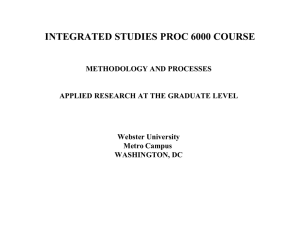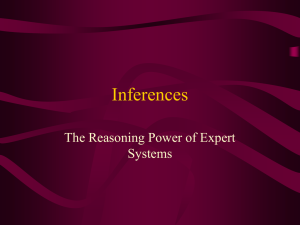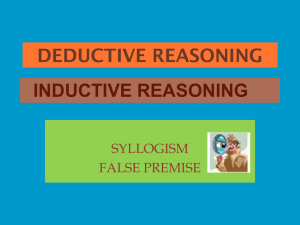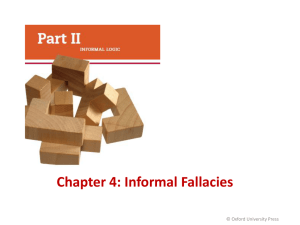Syllogism
advertisement
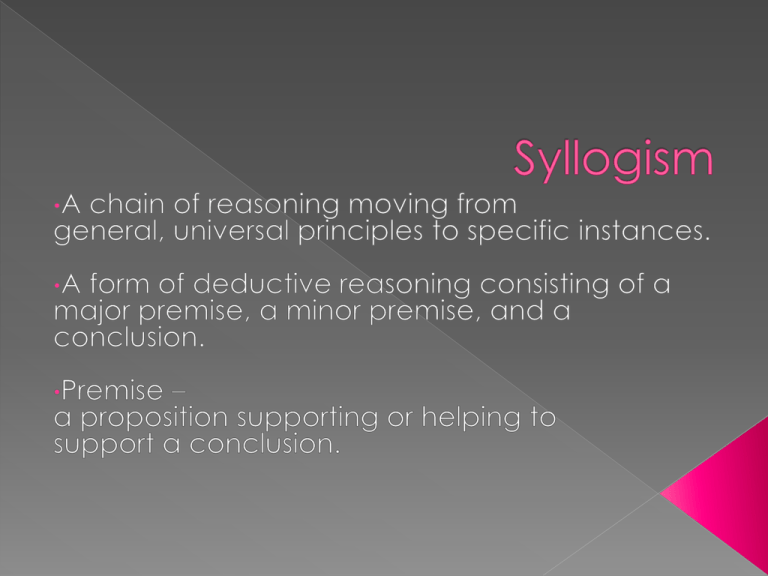
Suppose we know that all the things matching category “B” fits completely inside the larger category “A.” That’s the major premise, or the first argument. Suppose we can also prove that all things matching category “C” also fit inside the category “B.” That’s the minor premise, or the second argument. From these two statements, we can also conclude that all of “C” must fit in category “A” as well. Major Premise: All zebras are striped animals. Minor Premise: No zebras are polar bears. Conclusion: Therefore, no polar bears are striped animals. Major Premise: All clowns are funny individuals. Minor Premise: Some sad people are clowns. Conclusion: Therefore, some sad people are funny individuals. Major Premise: Some sticky substances are yucky things. Minor Premise: All taffy is a sticky substance. Conclusion: Therefore, some taffy is a yucky thing. Major Premise: All flies are winged creatures. Minor Premise: All butterflies are winged creatures. Conclusion: Therefore, all butterflies are flies. Major Premise: Those who study rhetoric speak eloquently. Minor Premise: AP Language and Composition students study rhetoric. Conclusion: AP Language and Composition students speak eloquently. •Major Premise: All people are mortal. •Minor Premise: Aristotle was a person. •Conclusion: Therefore, Aristotle was a mortal. Restructured as an enthymeme: Aristotle was mortal because he was a person. Aristotle states that under LOGOS, or the content of the message, the two most powerful tools are the enthymeme and the example. In an argument, the speaker or writer can leave out the universal principle typically stated in a syllogism because everyone should agree with it. For example, everyone should agree that all people are mortal. “It is quite recent history, Lord Randolph was Chancellor of the Exchequer, Lord Salisbury was Prime Minister, as he is now. And on the same issue of economy Lord Randolph Churchill went down - - forever. But wise words, Sir, stand the test of time. And his words were wise.” - from the movie Young Winston MAJOR PREMISE: MINOR PREMISE: CONCLUSION: Which is not stated? I wanted to serve as President because I love this country and because I love the people of this Nation.” -Jimmy Carter, 1980 Concession Address Major Premise: Minor Premise: Conclusion: Dr. Eldon Tyrell: “You were made as well as we could make you.” Roy Batty: “But not to last.” Dr. Eldon Tyrell: “The light that burns twice as bright burns half as long, and you have burned so very, very brightly, Roy.” Major Premise: Minor Premise: Conclusion: Which premise was not stated? “Ladies and gentlemen, I will not divide the Democratic Party. Therefore, tomorrow morning I will write to the Chairman of the Democratic Party withdrawing my candidacy.” -Thomas F. Eagleton Major Premise: Minor Premise: Conclusion: What premise is missing? “Now, I don’t know or have never met my candidate; and for that reason I am more apt to say something good of him than anyone else.” -Will Rogers Major Premise: Minor Premise: Conclusion: “The gloves didn’t fit. If it doesn’t fit, you must acquit.” -John Cochran, Closing arguments of the O.J. Simpson trial Major Premise: Minor Premise: Conclusion:

